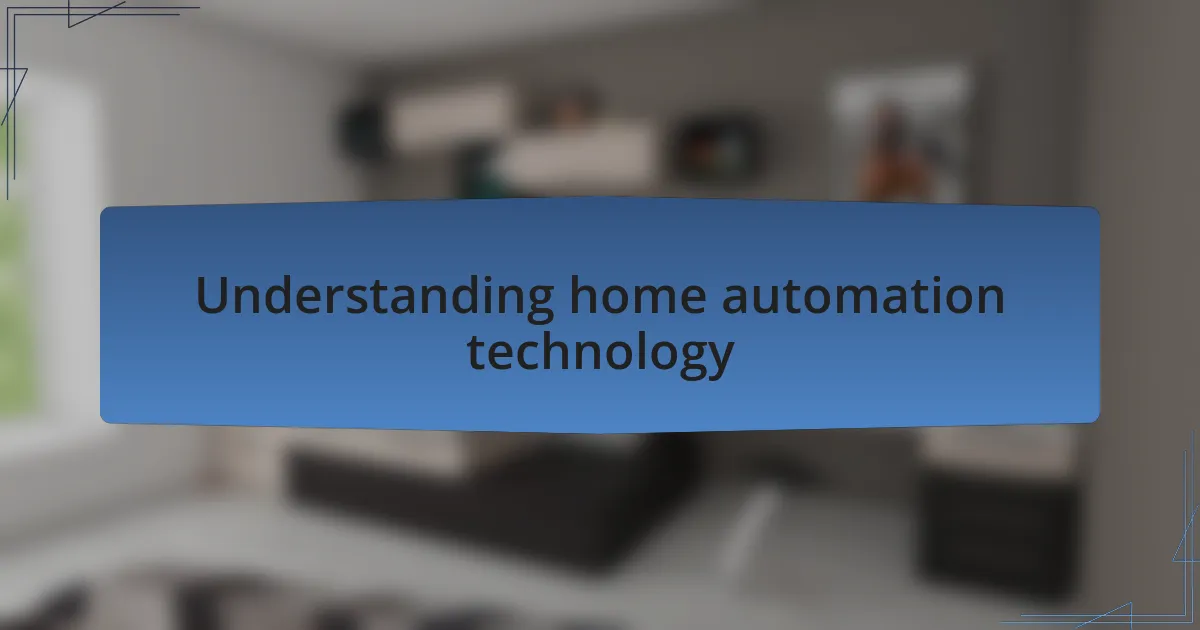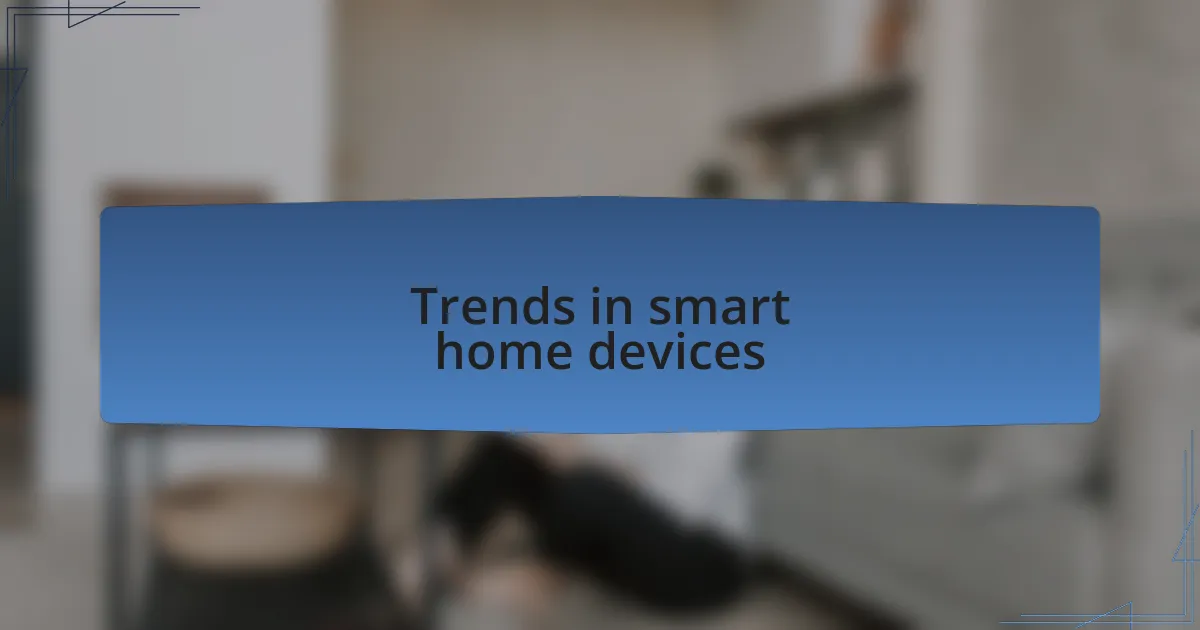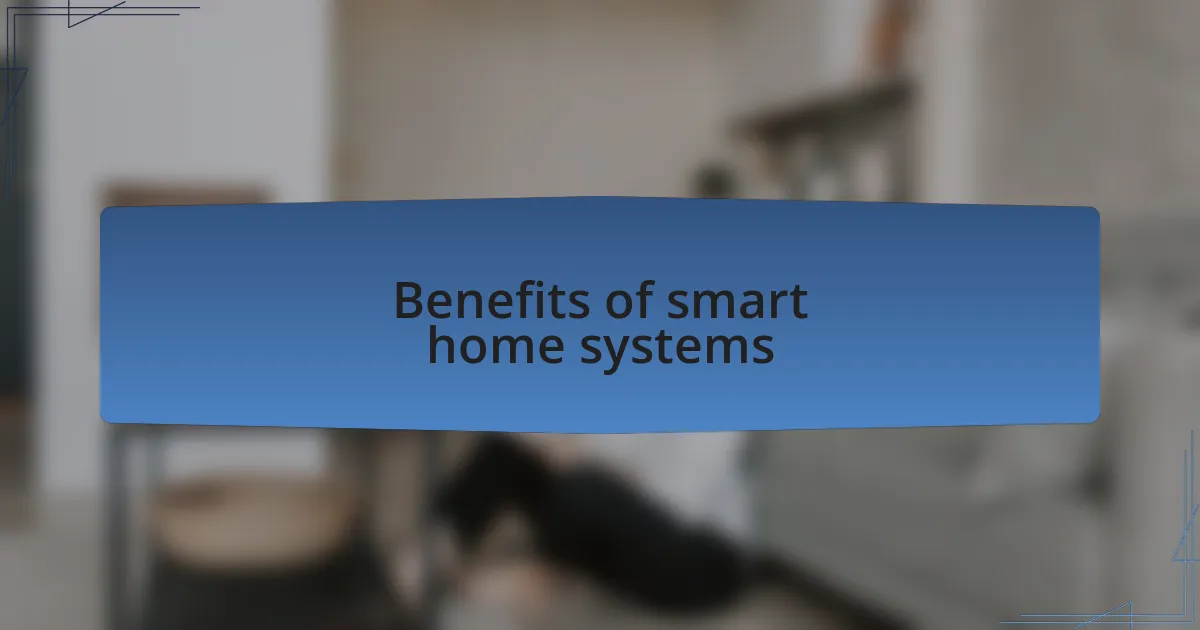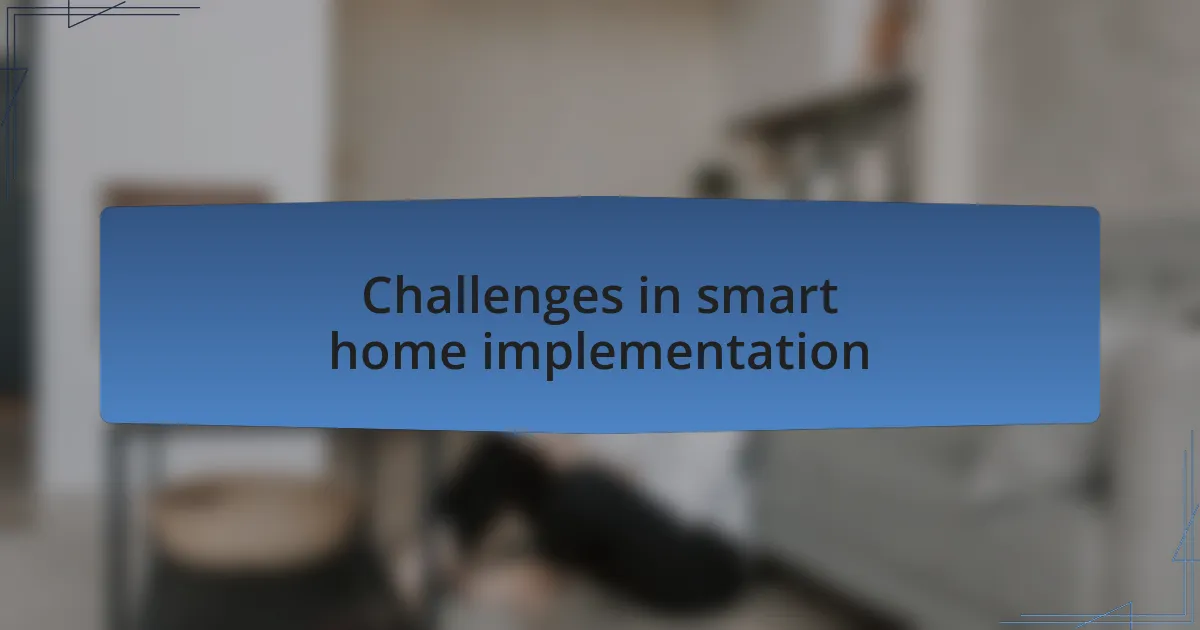Key takeaways:
- Home automation technology enhances convenience, comfort, security, and energy efficiency through interconnected devices.
- Key trends include interoperability among devices, energy efficiency, and the integration of artificial intelligence for personalized experiences.
- Smart home systems provide significant benefits such as improved security, reduced energy costs, and alleviation of daily stressors.
- Challenges include device compatibility issues, privacy concerns, and the financial costs associated with setting up smart home systems.

Understanding home automation technology
Home automation technology revolutionizes the way we interact with our living spaces. I remember the first time I programmed my smart lights to gradually brighten in the morning; it felt like waking up to a gentle sunrise instead of the jarring sound of an alarm clock. Have you ever considered how much your daily routine could change with these kinds of small adjustments?
At its core, home automation encompasses a network of devices connected via the Internet, enabling remote control and customization. This interconnectedness allows for incredible convenience. Imagine being able to check if you locked your front door or to preheat your oven on your way home from work—all from your smartphone. Isn’t that a game-changer?
Understanding the basics of this technology opens up a world of possibilities for enhancing comfort, security, and energy efficiency in your home. It’s exciting to think about how gadgets can learn our habits. For instance, my thermostat now adjusts itself based on my schedule, which not only saves energy but also keeps my home feeling just right. How have you noticed technology adapting to your lifestyle?

Trends in smart home devices
As I delve into the trends in smart home devices, one standout is the increased emphasis on interoperability. I recently grappled with a few brands that didn’t quite play nicely together, and it made me realize how vital it is for devices to communicate seamlessly. Have you ever felt frustrated when your smart speaker couldn’t control your smart lights? That cross-compatibility is becoming more common, making our homes not just smart but also truly cohesive environments.
Energy-efficient devices are also taking center stage in home automation. I’ve personally been amazed at how smart plugs can monitor energy usage and suggest how to save on bills. This trend not only helps my wallet but also speaks to a growing awareness of environmental impacts. Have you considered how those little changes in your home could contribute to a larger movement toward sustainability?
Another exciting trend is the integration of artificial intelligence (AI) into smart home systems. I remember experimenting with a voice-controlled assistant—eager to find its limits. The way it learned my preferences over time, like when to play calming music or dim the lights at night, felt almost magical. Isn’t it fascinating how technology can adapt to our specific habits and improve our daily life experience?

Benefits of smart home systems
Smart home systems offer unparalleled convenience that truly enhances our everyday lives. I recall a time when I rushed home from work and forgot to turn on the heat; a quick voice command while in the car helped me arrive to a cozy atmosphere. How amazing is it that technology can alleviate the small stressors we face?
Another significant benefit is security. I’ve invested in smart cameras and door locks, which give me peace of mind, especially when I travel. I remember being anxious during a trip, constantly checking my phone for alerts. Now, with real-time monitoring, I can relax and genuinely enjoy my time away, knowing my home is protected.
Efficiency is also a game changer. With energy use awareness at the forefront of my smart devices, I’ve noticed a substantial drop in my utility bills. Just the other day, I received a notification suggesting I adjust my thermostat while I was at work, proving that these systems can not only save money but also promote a more environmentally-friendly lifestyle. Have you experienced similar shifts in your energy consumption since adopting smart home technology?

Challenges in smart home implementation
Moving from theory to practice in smart home implementation can be quite a hurdle. I remember when I attempted to set up a few devices at once; I was overwhelmed by compatibility issues. Some devices simply wouldn’t connect, leaving me frustrated and questioning the reliability of the technology. How often have you felt that sting of frustration when eagerly setting up a new gadget, only to find it doesn’t play nicely with others?
Privacy concerns also loom large in the smart home landscape. I find myself wary every time I hear about data breaches or unauthorized access to personal information. With smart devices constantly collecting data, there’s an underlying anxiety about how that information might be used. Do you ever wonder who has access to your daily habits and routines through these devices?
Moreover, the investment required for a comprehensive smart home setup can deter potential users. I considered a full system upgrade once but quickly realized that the costs add up fast. It led me to ask: is the convenience worth the financial burden? This balancing act between technology and expense is an ongoing challenge for many homeowners, often leading to hesitance in embracing the smart home revolution.